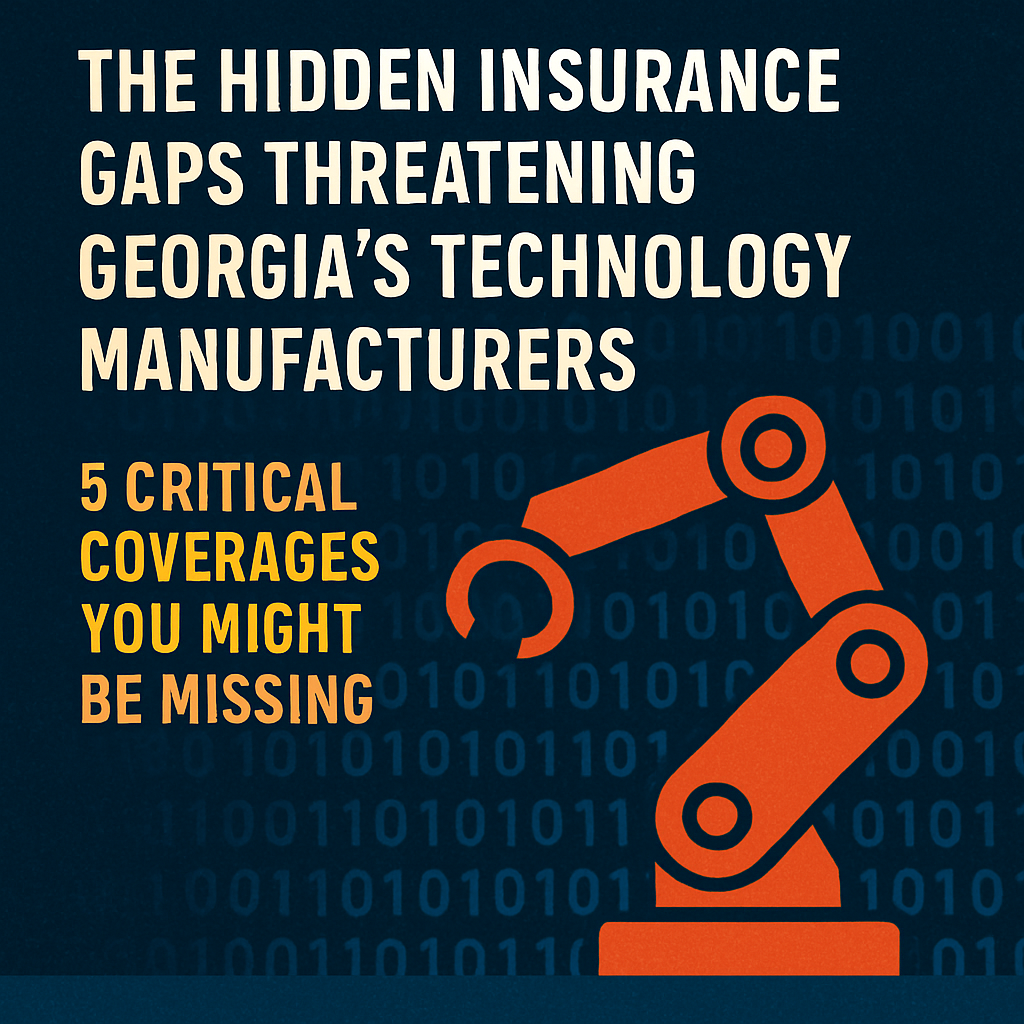5 Critical Coverages You Might Be Missing

One Missed Clause Could Cost You Millions
Would your insurance actually protect you if your robotics software caused a product failure—or if a ransomware attack brought your production line to a standstill? Have you ever dug into whether your policy covers your most valuable asset: your intellectual property?
If you’re not sure, you’re not alone—and that uncertainty could be costing you more than you think.
In this article, we’re breaking down the five most critical insurance gaps threatening Georgia’s tech manufacturing sector right now—along with what you can do to address each one. You’ll walk away knowing exactly where your vulnerabilities lie and how to secure the protection your business needs to thrive in today’s complex risk environment.
Georgia’s Tech Sector Is Booming—But So Are the Risks
With over 450 tech manufacturers now operating across the state and annual growth exceeding 4%, Georgia has quickly become a national hub for electronic components, precision manufacturing, and smart technology development. But with innovation comes complexity—and too often, insurance coverage doesn’t evolve at the same pace.
Legacy policies weren’t built for integrated systems, remote supplier dependencies, or the realities of a cloud-driven manufacturing environment. The result? More companies are discovering major insurance blind spots—after a loss has already happened.
Download the Tech Manufacturing Insurance Gap Assessment Checklist (PDF)
1. Cyber Insurance That Doesn’t Cover Operations
Most cyber policies were built for data breaches. But what if your operational technology (OT) is hacked and held hostage?
One Georgia firm learned the hard way: a ransomware attack encrypted their manufacturing systems. Their cyber policy covered the ransom—but not the $1.2 million in business interruption costs that followed. Why? The systems weren’t labeled as “IT.”
Today’s ransomware trends in manufacturing demand more comprehensive protection—covering not just stolen data, but also OT downtime and production loss.
Look for coverage that includes:
- OT and IoT system failures
- Business interruption without a breach
- Intellectual property theft
- Supply chain cyber vulnerabilities
2. No Protection for Your Intellectual Property
If your designs, code, or trade secrets were stolen tomorrow—how would you recover?
For most manufacturers, intellectual property is the core value of the business. Yet standard insurance programs often exclude IP loss altogether.
In Georgia, where IP litigation trends have spiked over the past five years, the absence of protection could be devastating.
Common gaps include:
- No defense for infringement claims
- No trade secret coverage
- No enforcement cost reimbursement
- No protection for process methodologies
Suggested Visual: Table comparing types of IP vs. what’s typically covered
3. Business Interruption That Ignores Your Supply Chain
If your factory floods, your BI policy kicks in. But what if your overseas supplier gets hit with a regulatory shutdown? For most policies, no physical damage = no payout.
During the 2023 chip shortage, Georgia tech manufacturers reported average losses of $157,000 per week. Many BI claims were denied—because the disruption didn’t happen on their premises.
You might be unprotected if:
- Suppliers are international
- The delay wasn’t caused by property damage
- Regulatory shutdowns halted production
- Tech platforms or cloud vendors caused delays
Learn more about contingent business interruption coverage, and how to ensure your policy includes coverage for supply chain risks like the chip shortage.
4. Outdated Equipment Insurance That Misses Smart Tech
Smart manufacturing runs on robotics, proprietary software, and calibrated systems—not just gears and motors. But standard equipment breakdown policies haven’t kept up.
If your robotic arm fails because of a firmware update, or if a calibration tool goes offline, chances are your current coverage won’t help.
In Georgia, a single day of downtime can cost $38,000. And smart equipment repairs are over three times more expensive than traditional ones.
What to add:
- Coverage for digital and hybrid systems
- Firmware and performance degradation protection
- Commissioning and calibration safeguards
5. Product Liability That Excludes Software Issues
With the rise of IoT and embedded software, liability risks are shifting. But most standard policies only respond when physical damage occurs. That’s a problem when claims are triggered by things like a faulty sync, corrupted data, or exploited vulnerability.
Non-physical damages in tech insurance are a rising concern, and so are embedded software liability claims.
What’s often missing:
- Liability for non-physical damages
- Coverage for patches and software updates
- IP theft via product vulnerability
- Protection against data corruption
Conclusion: Don’t Wait to Discover the Gaps After a Loss
Georgia’s technology manufacturers are innovating at warp speed—but far too many are relying on outdated insurance structures that weren’t built for modern risk.
The gaps we’ve outlined—cyber liability, IP protection, supply chain disruption, smart equipment coverage, and software-driven product liability—are no longer fringe concerns. They’re central to the operational and financial health of your business.
Your Next Steps:
Schedule a complimentary policy review with Oak Insurance Group
Explore more insurance strategies for manufacturers to make sure you’re protected now—and ready for what’s next.

